Peter MALONE
Saturday, 18 September 2021 19:56
Min and Bill
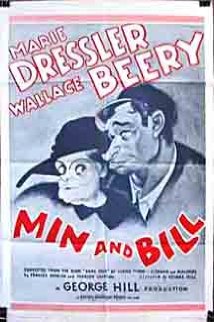
MIN AND BILL
US, 1930, 69 minutes, Black and white.
Marie Dressler, Wallis Beery, Dorothy Jordan, Marjorie Rambeau.
Directed by George Hill.
Min and Bell is a brief comedy, set on the northern Californian coast amongst the boats and the sailors’ hotels on the coast. It is a rough setting designed for some slapstick comedy with the touch of violence.
Comedian Marie Dressler won an Oscar for this performance, an older woman, rough in manner and language, not good at showing emotions, who has adopted a little girl, now grown to a teenager, Nancy, played by Dorothy Jordan, who has been abandoned at her place by her slatternly mother, Belle, Marjorie Rambeau. Always hanging around the place is Bill, a rough fisherman, with an attachment to Min but also a roving eye.
Complications come when the young girl is flirts, is accosted by a man to be taken on to the streets. She is also a truant from school, working hard for her adoptive mother, but likes it. Min has saved up a lot of money for a rainy day and decides to invest it for Nancy, arranging for her to go to a private school and be educated as a lady – where she falls in love with a rich heir whom she had previously encountered in an upset with his boat.
Bill is always hanging around, Wallace Beery doing his usual performance. Marjorie Rambeau is very effective as the irresponsible and fun-loving Belle. But the film definitely belongs to Marie Dressler who appeared in Dinner at Eight and died in the early 1930s.
1. A rough comedy of 1930? The types, their activities, manner of speech, rough lives?
2. The title, the Oscar performance for Marie Dressler? The presence of Wallace Beery? Min and her age, experience, from Seattle, down the coast, wanting to return, saving the money? Her rough dress style, manner of speaking? Ordering the men around? Issues of drink and smuggling? The fishermen? Keeping order in her place? Hiding the money in the sock?
3. The production values, MGM, 1930, black and white photography, editing, comic style – and the special effects for the boat chase? The musical score?
4. Nancy, her age, abandoned by her mother, more or less adopted by Min? Her hard work, flirting, the man wanting her to go away, with implication for prostitution, and Bill hitting him, devotion to Min, playing truant, the authorities, her having to go to school, Min sending her to live with the family, her education, running away? Her not knowing her mother? Min getting the money, paying the couple to send her to the best school, two years, her education, falling in love with the heir? Returning on the boat, the chance encounter with Belle? Min not wanting to see her, wanting to give her independence, Nancy’s visit, Min and her rough reaction? Thinking that to live with the couple would be charity and not wanting it? Nancy and the happy ending with the wedding?
5. Bill, his character, fishermen, floating, drinking, friendship with Min? The attraction to Belle? The comic rouseabout?
6. lle, her past, leaving her daughter, not coming for 10 years, the clashes with Min? Min and her love for Nancy, yet not able to show it? Belle leaving again, returning on the ship, her bad reputation, the chance encounter with Nancy? Her wanting to stay, suspicious of Min? Seeing her daughter, wanting the money, Min and the gun for protection, pulling it, Belle attacking with the scissors, Min shooting her?
7. Min being taken away, watching the end of the wedding, happy, at least, in providing for Nancy? Her future?
Published in Movie Reviews
Published in
Movie Reviews
Tagged under
Saturday, 18 September 2021 19:56
National Treasure
NATIONAL TREASURE
US, 2004, 131 minutes, Colour.
Nicolas Cage, Diane Kruger, Justin Bartha, Sean Bean, Jon Voight, Harvey Keitel, Christopher Plummer.
Directed by John Turteltaub.
Dan Brown has a lot to answer for. Even though he did not initiate religious and political conspiracy theories with mysterious codes to decipher (in fact, he is quite derivative of a long line of novels and studies), he has so popularised them with his Angels and Demons (which is a better read than its Da Vinci sequel, though both would fail any basic history or religion exam) and the extraordinary best-selling history of The Da Vinci Code that we can expect any number of books and films that set us going on codes. What is it about us that codes and conspiracies have more credibility than actual history?
This can serve as a prologue to a review of a very entertaining actioner, National Treasure. It works very well and can serve as a guilty pleasure if seen by workaholics or serious historians. And it is about code-breaking to find the Knights Templar treasure – again. But how can we believe that it was transferred to the US before the 18th century with no one, except Ben Franklin and a few of the Founding Fathers noticing, let alone in the quantities that were hidden in... but that would be to spoil it all. One had better not mention where the code is located either – even more ingenious than in Da Vinci’s works.
Nicolas Cage is a man with a mission, inherited from his grandfather, Christopher Plummer, but poo-pooed by his sceptical father, Jon Voight. But, once on his way to find the treasure (including a trip to a boat in the Arctic where he falls foul of his greedy buddy (Sean Bean) and his cronies, he picks up a dim associate (Justin Bartha) and an expert on documents (Diane Kruger). In the race against time and the greedy, as well as the authorities, there are plenty of adventures, as if Indiana Jones were operating in Washington and New York, including stealing the Declaration of Independence.
With tongue firmly in cheek, director Jon Turteltaub takes us on a heady, serious and comic chase which serves as top escapist entertainment. There was an entertaining sequel in 2007, National Treasure: Book of Secrets.
1. An entertaining adventure? Heist? action show? Detection, clues, puzzle?
2. The plot, ingenious, the story of the treasure, the Knights Templar, the transfer to North America, concealed, the Freemasons, the Fathers of the Declaration of Independence, conspiracies? The Gates family and investigation, the grandfather, his devotion to detection, the father and his scepticism, Ben as a boy, growing up, the clue about Charlotte?
3. The New York settings, Washington DC, the Declaration? Philadelphia and the Liberty Bell? New York and Wall Street? Boston and the church?
4. The cast, international, the score?
5. The prologue, the character of young Ben, listening to the stories of his grandfather, the tradition of his family?
6. The Arctic, Ben and Riley, Ian and his associates? The search, the finding of the ship, the identification, the interiors, the pipe, the gun powder? Ben
working out the clues? The explosion? Ben and Riley, their escape? Return?
7. Going to the FBI, to other authorities, not being believed? Going to Abigail and expertise on documents? Not being heard? The plan, Ian and his threat, wanting to thwart him by stealing the Declaration?
8. Riley, his technology, information, ability to get into the library? Issues of security? The party, Ben and his entry, the success, the basement, going to the shop, buying a copy of the Declaration, using his credit card – and detection?
9. Abigail, her character, listening with tolerance, not believing Ben? Seeing him leave, his taking her and the escape, her exasperation? The police, going into action? Ben and Riley and the escape?
10. Ian, his threats, the pursuit of Ben, thinking he had the Declaration?
11. The decision to go to Patrick, the father’s reaction to Ben and his theories? The discussion about the invisible writing, heat, lemons? The work, discovering the further clues? The arrival of the police, Patrick’s response?
12. The information, the codes, going to Philadelphia, the Liberty Bell, daylight saving, going up the tower, Ian and his pursuit, chasing Ben, Ben jumping?
13. Going to Wall Street, the story of the past, the church, Parkington Lane, identifying the grave, through the headstone, the vast interiors, the stairs, collapsing and the adventure, swinging to safety, going down, the dead end?
14. Ben, his ingenuity, saving the group, sending Ian and his friends to Boston with the story of Paul Revere? The going to Boston, the detective arresting them?
15. The breakthrough, the vastness of the treasure, the ability to get out? The lighting up of all the treasure through the flames?
16. The detective, the role of the authorities, skill in detection, following Ben, following the clues, coming to the church, the treasure? Ben and his giving away the treasure? In exchange for his freedom?
17. His father, being taken by Ian, present at the finding of the treasure, his admitting the truth?
18. The happy and romantic ending, the good deeds for all the museums? The end of a satisfying adventure?
US, 2004, 131 minutes, Colour.
Nicolas Cage, Diane Kruger, Justin Bartha, Sean Bean, Jon Voight, Harvey Keitel, Christopher Plummer.
Directed by John Turteltaub.
Dan Brown has a lot to answer for. Even though he did not initiate religious and political conspiracy theories with mysterious codes to decipher (in fact, he is quite derivative of a long line of novels and studies), he has so popularised them with his Angels and Demons (which is a better read than its Da Vinci sequel, though both would fail any basic history or religion exam) and the extraordinary best-selling history of The Da Vinci Code that we can expect any number of books and films that set us going on codes. What is it about us that codes and conspiracies have more credibility than actual history?
This can serve as a prologue to a review of a very entertaining actioner, National Treasure. It works very well and can serve as a guilty pleasure if seen by workaholics or serious historians. And it is about code-breaking to find the Knights Templar treasure – again. But how can we believe that it was transferred to the US before the 18th century with no one, except Ben Franklin and a few of the Founding Fathers noticing, let alone in the quantities that were hidden in... but that would be to spoil it all. One had better not mention where the code is located either – even more ingenious than in Da Vinci’s works.
Nicolas Cage is a man with a mission, inherited from his grandfather, Christopher Plummer, but poo-pooed by his sceptical father, Jon Voight. But, once on his way to find the treasure (including a trip to a boat in the Arctic where he falls foul of his greedy buddy (Sean Bean) and his cronies, he picks up a dim associate (Justin Bartha) and an expert on documents (Diane Kruger). In the race against time and the greedy, as well as the authorities, there are plenty of adventures, as if Indiana Jones were operating in Washington and New York, including stealing the Declaration of Independence.
With tongue firmly in cheek, director Jon Turteltaub takes us on a heady, serious and comic chase which serves as top escapist entertainment. There was an entertaining sequel in 2007, National Treasure: Book of Secrets.
1. An entertaining adventure? Heist? action show? Detection, clues, puzzle?
2. The plot, ingenious, the story of the treasure, the Knights Templar, the transfer to North America, concealed, the Freemasons, the Fathers of the Declaration of Independence, conspiracies? The Gates family and investigation, the grandfather, his devotion to detection, the father and his scepticism, Ben as a boy, growing up, the clue about Charlotte?
3. The New York settings, Washington DC, the Declaration? Philadelphia and the Liberty Bell? New York and Wall Street? Boston and the church?
4. The cast, international, the score?
5. The prologue, the character of young Ben, listening to the stories of his grandfather, the tradition of his family?
6. The Arctic, Ben and Riley, Ian and his associates? The search, the finding of the ship, the identification, the interiors, the pipe, the gun powder? Ben
working out the clues? The explosion? Ben and Riley, their escape? Return?
7. Going to the FBI, to other authorities, not being believed? Going to Abigail and expertise on documents? Not being heard? The plan, Ian and his threat, wanting to thwart him by stealing the Declaration?
8. Riley, his technology, information, ability to get into the library? Issues of security? The party, Ben and his entry, the success, the basement, going to the shop, buying a copy of the Declaration, using his credit card – and detection?
9. Abigail, her character, listening with tolerance, not believing Ben? Seeing him leave, his taking her and the escape, her exasperation? The police, going into action? Ben and Riley and the escape?
10. Ian, his threats, the pursuit of Ben, thinking he had the Declaration?
11. The decision to go to Patrick, the father’s reaction to Ben and his theories? The discussion about the invisible writing, heat, lemons? The work, discovering the further clues? The arrival of the police, Patrick’s response?
12. The information, the codes, going to Philadelphia, the Liberty Bell, daylight saving, going up the tower, Ian and his pursuit, chasing Ben, Ben jumping?
13. Going to Wall Street, the story of the past, the church, Parkington Lane, identifying the grave, through the headstone, the vast interiors, the stairs, collapsing and the adventure, swinging to safety, going down, the dead end?
14. Ben, his ingenuity, saving the group, sending Ian and his friends to Boston with the story of Paul Revere? The going to Boston, the detective arresting them?
15. The breakthrough, the vastness of the treasure, the ability to get out? The lighting up of all the treasure through the flames?
16. The detective, the role of the authorities, skill in detection, following Ben, following the clues, coming to the church, the treasure? Ben and his giving away the treasure? In exchange for his freedom?
17. His father, being taken by Ian, present at the finding of the treasure, his admitting the truth?
18. The happy and romantic ending, the good deeds for all the museums? The end of a satisfying adventure?
Published in Movie Reviews
Published in
Movie Reviews
Tagged under
Saturday, 18 September 2021 19:56
Goodfellas
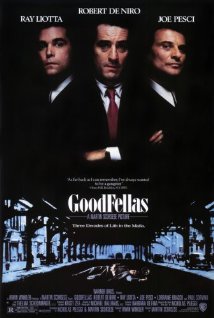
GOODFELLAS
US, 1990, 146 minutes, Colour.
Robert De Niro, Ray Liotta, Joe Pesci, Lorraine Bracco, Paul Sorvino, Frank Silvero, Mike Starr, Henny Youngman, Jerry Vale, Debi Maza, Samuel L.Jackson, Frank Vincent, Robbie Vinton, Catherine Scorsese, Charles Scorsese.
Directed by Martin Scorsese.
The title is Mafia slang the gangsters (also Wiseguys). This true story of small-time but power-hungry and greedy hoodlums takes place from the 50s to the 80s, drawing us persuasively into the life-styles and the moral (immoral) codes they live by.
Martin Scorsese presents his Mafia story less in epic than “myth-making” perspective, showing us that these people do these things and live like this. It is a disturbing experience. They behave brutally, callously, often insanely. But we see the complexities of their day to day lives which makes them real – not just names in ugly headlines.
Ray Liotta carries the film is Henry Hill his career (gladly chosen and fostered) takes him from local crime and protection to huge drug deals. Robert De Niro steps back from centre-stage as a smilingly ruthless Goodfella. Joe Pesci, who won an Oscar for Best Supporting Actor, shows us the absolute psychopath. Lorraine Bracco is very good as Henry Hill’s Jewish wife. Paul Sorvino is also persuasive as the local capo. Singer Jerry Vale appears as himself as does comedian Henny Youngman.
The film is based on a book by Nicholas Pillegi who co-wrote the script with director Martin Scorsese. Martin Scorsese has had a long and vast career with all kinds of powerful films including Mean Streets, Taxi Driver, Casino, Gangs of New York and, finally winning an Oscar for Best Director for the 2006 The Departed. (Scorsese’s mother, Catherine Scorsese, his father, Charles Scorsese, appeared in a number of his films and both here, especially his mother and an excellent cameo as Joe Pesci’s mother.)
1. A gangster film? 1990s perspective, 1950s and 1960s and 1970s?
2. The work of the Scorsese, his career, his gangster films and perspectives? Realism rather than creating myths?
3. The New York settings, the neighbourhood, the streets, homes, the owners, the popular songs of the period – Rags to Riches, Ane he kissed me…? The later songs of the period? The musical score?
4. The prologue, the three men driving, the noise from the boot, stopping, opening it, stabbing the victim, shooting him? The later burial sequence? Having to dig him up?
5. Henry Hill and his voice-over, Ray Liotta’s performance in the role? The tone of voice, as a boy, his place in the family, his parents and their attitude, his background? His younger brother and his disability? Henry wanting to be a gangster, young teenager and connections, the diner, with Paulie, driving and parking limousines? Wanting to be someone? The truancy, his father and the belt, hitting? Thinking he had everything – when schoolfellows would carry his mother’s groceries out of respect?
6. His mother, devotion to her son? The father, Irish, angry, the seven children, the beatings? Disapproving of Henry’s work?
7. Paulie, the boss of the area, a small capo? Letting and encouraging Henry to be part of the world, protecting him? The protection in the area, those in need, but always his cut? Taciturn and unobtrusive?
8. Jimmy Conway, Robert de Niro and the character, the introduction, flashing cash around, gambling, the tips? His career, the hits, brutal but that everything’s business, his love for stealing, Jimmy the Gent? The truck drivers and smuggling, paying the police, his partners, his friendship with Tommy?
9. Henry, his friendship with these types and, finding himself in court, the corrupt judge, everybody congratulating Henry for not ratting and keeping his mouth shut?
10. Henry as an adult, the stories of the airport, the robberies? The other wiseguys and connections? The style of the introducing each of them by name, with the characteristics? Wanting something and just taking it, not even thinking about?
11. Tommy, his patter and language? The improvised scene with Pesci and Liotta about whether he was funny – and trying to take in Henry? The manager asking for his payment and his getting angry? His later anger with a young man and the drinks, shooting him in the foot, shooting him dead? No remorse or afterthought?
12. Paulie and the restaurant, the owner pleading his cause, wanting to be a partner, Henry present, yet the protection money, paying it off, too much for the owner, the setting up of the arson?
13. Henry‘s life, Tommy wanting his back up with the double date, Henry impatient, not liking Karen, walking out? The future date, standing Karen up, her accosting him in the street, shouting?
14. Karen and Henry going out, his romantic attitude, Bruce the boyfriend, playing tennis, Henry and his anger, bashing Bruce brutally, getting Karen to hide the gun, her being turned on by this? The Jewish background, the comments of her mother, Henry’s charm, the wedding, elaborate, the music and dancing, all the guests and lining up to give the money?
15. The man with the wig advertisements, Jimmy and his strong reaction? The man keeping pace, always friendly, involved in the robbery, finally killed by Jimmy?
16. The marriage, Henry, the children, staying, out all night, his mother in law complaining? The sequence with the wives, frantic, loud, the issues of make up? Karen saying that they were always together, birthday celebrations, going to Las Vegas, always with the group and no one outside the group? And her pride in this?
17. The date 12 June 1970, Queens? The man getting out of prison, the taunting of Tommy, the brutal bashing and shooting, his death? The return to the house? Tommy going to see his mother, her pride in him, the meal, Jimmy saying it was tasty? Tommy taking the big knife, cutting up the body?
18. Social life, the Copacabana, the guests, Jerry Vale and his singing? Friday the night with the girlfriends, of the men and mistresses? Saturday for the wives and children? The setting up of apartments with mistresses? Henry and lavish apartment for Janis? Janice and her friend Sandie?
19. The marriage, Henry and his infidelity is, Karen’s reactions? The pressure on Henry by Paulie and Jimmy too ensure that his marriage was respectable?
20. The incident in Tampa, the Zoo, the murders? The coincidence of the FBI typist and her brother? The arrest, and call to the hearings, the sentences? The prison style?. Jimmy in another prison, Paulie with Henry, hotel-style, the food and groceries, the cooking, the guards? Henry, gradually being involved in drugs, the visits, and Karen becoming part of this business, Janis and the visit and Karen resenting this? Her later going to the apartment and pressing all
the buttons and Janis upset? Concealing this from Paulie?
21. The years passing, Henry getting out, the return to Karen? Paulie and his warmth? Sandie and and drugs, taking them, cutting them for Henry? Jimmy and Tommy participating, the money?
22. The plan for the robbery at the airport, the biggest ever, the range of people involved, the information, participants, each with their role, though plan – and its happening off screen, the success? The stupidity some of the criminals, buying lavish cars, fur coats for the women, Jimmy and his harsh anger? Stax and his involvement, technical? The beginning of the killings, Jimmy wanting all control, gradually eliminating all the other members of the plan? Brutality? Morrie continually asking Henry the help, wanting to talk with Jimmy, Jimmy’s plan, Morrie and his wife, Jimmy killing them both ? Jimmy becoming happier with because of the killings and the money?
23. Tommy, the invitation to be “made”, Jimmy’s joy and pride, the phone calls, the brutal slaying of Tommy and the motivation?
24. 11 May 1980, Henry and his activity, the car, with the drugs, the helicopter continually flying over, his movements, at home, cooking, checking on the helicopter’s presence, with Karen, going to Sandie, the cutting of the drugs, his continued cooking for his brother? The babysitter, her participation, stupid attitude, making the phone call from home despite being told not to, Henry driving out with her, the arrest?
25. The aftermath, Jimmy and Paulie poorly arrested? Henry in prison, his mother-in-law providing the bail, mortgaging her house?
26. Henry helped, his fear of being killed, thinking that to go to Florida would be his death?
27. The witness protection program, the discussions, Jimmy and Paulie arrested, in court, Henry’s testimony? The decision to go into witness protection?
The severing all ties with the family? And Henry saying the hardest part was thinking this part of his life which he loved was over? That in witness protection he was an average nobodyy?
28. Final information, prison sentences, deaths, Henry and Karen separating?
29. The writer and the director immersing the audience in this goodfellas’ world?
Published in Movie Reviews
Published in
Movie Reviews
Tagged under
Saturday, 18 September 2021 19:56
All in Good Time
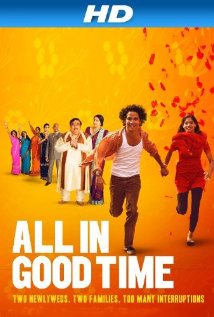
ALL IN GOOD TIME
UK, 2012, 98 minutes, Colour.
Reece Ritchie, Amara Karan, Harish Patel, Meera Syal.
Directed by Nigel Cole.
All in Good Time is an adaptation of a 1960s played by Bill Naughton, The Family Way. It has been transferred to the 21st century, to an Indian community in Bolton, Lancashire.
The film opens with an Indian wedding with all the trimmings – but very much in the English town. The point of the title is that, with the intrusion of the hero’s father, a jovial and drinking man, and the closeness of the rooms in the house, bedrooms and bathroom, the marriage is not consummated. This leads to self-doubt on the part of the husband, upset on the part of the bride who has been keeping herself for her marriage, concern on the part of both sets of parents, and gossip around the town.
Reece Ritchie shows the anxiety of the young husband, his tension with his father, the support of his mother. Amara Karan is very attractive as the bride. Veteran Indian performers, Harish Patel as the father and Meera Syal, writer and performer, especially the grandmother in the Kumars at number 42, offer some drama as well as cause for reflection for the audience. This involves the father taking his best friend to Blackpool on the couple’s honeymoon – and possible consequences for the wife, the husband, and the paternity of the son.
The film captures the atmosphere of the Indian community, its place in English society, the traditions from India in the contemporary world – leading to comedy as well as pathos and drama.
The film was directed by Nigel Cole, who directed such comedies as Saving Grace and Calendar Girls.
1. An entertaining film about marriage in an English setting, Indian setting? Lancashire, the town of Bolton? The background of India, culture, traditions and rituals? Transplanted to the United Kingdom, surviving but changing? Local traditions?
2. Film based on a play, parallels with The Family Way and its adaptation to the 21st century?
3. The title, marriage, the fulfilment and consummation?
4. Bolton, the town, the buildings, the Indian streets, homes, ordinary and wealthy, the Indian cinema, the hotel, the airport – a feel for Bolton, Lancashire?
5. The musical score, English traditions, Indian traditions, Hollywood and the cinema? The glimpses of the films in the clips?
6. The opening, the wedding, the ceremony, the happy couple, Atul and Vina? The Patel family, well-to-do, letting their daughter go? Atull’s family, the serious mother, the boisterous father, his drinking, talking, the guests at the wedding, the friends? The effect on the couple?
7. Their going home, the small room, the adjacent room of the parents, the shared bathroom? The bed? The father, his intruding?
8. The consummation, the awkwardness, Vina wanting the first night to be special, her virginity? The various interruptions, the father, the effect on Atul? The non-consummation? The growing gossip, the women across the street and working at the cinema? Vina and her visit to her mother, telling the truth, the Patel’s visiting the other family, the discussions?
9. Atul, the clashes with Vina, the role of his parents, the room, the fights, going to the hotel, that not being successful, sleeping at the cinema? The manager and his crass comments about Vina, Atul and his anger and leaving?
10. His mother, sensible, supporting her son? The discussion with the Patels, mocking her husband for taking his best friend on the honeymoon to Blackpool, her admiration for the friend – and the audience realising that Atul might be his son?
11. The father, his drinking, boisterous, his wife telling the story of his life in India, the struggle, coming to the United Kingdom, the story of his friendship, the honeymoon – and the video flashbacks?
12. Atul and the clash with his father, his father unable to talk seriously with him, offering a drink? Atul, the middle of the night, the exasperation? The final stance of his father, urging on his son, proud of him, and Atul going to pursue Vina?
13. Vina at her home, Atul arriving, the apology, the conversation, the sexual consummation – and the neighbours’ and everybody’s reaction? Atul’s brother?
14. The decision to go to Blackpool, the brother, the friend and the cab, the failure of the travel agency and their initial intentions to go to Goa? The farewell by the father, seeing the image of his friend in his son’s waving farewell? His puzzle about the resemblance? A rueful ending, his wife’s apology?
15. 21st century English look at a family, situations, parents, limits, Indian background, the community, love, marriage, consummation hopes?
Published in Movie Reviews
Published in
Movie Reviews
Tagged under
Saturday, 18 September 2021 19:56
Blues in the Night
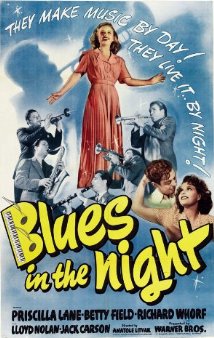
BLUES IN THE NIGHT
US, 1941, 88 minutes, Black and white.
Priscilla Lane, Betty Field, Richard Whorf, Lloyd Nolan, Jack Carson, Wallace Ford, Elia Kazan, Peter Whitney, Billy Halop, Howard Da Silva.
Directed by Anatole Litvak.
Blues in the Night is a rather offbeat drama/melodrama of 1941 from Warner Brothers. It is a film about music – as the title would indicate with the song and various arrangements of Blues in the Night played throughout the film.
The focus of the film is a piano player and composer played by Richard Whorf, later a director of musicals and comedies at MGM. He is friendly with some other musicians who form a band with him. They include Jack Carson who is married to Priscilla Lane who sings for the group. Of particular interest is Elia Kazan, the celebrated stage and screen director (Oscars for Gentleman’s Agreement and On the Waterfront, as well as films like A Streetcar Named Desire, Viva Zapata, Wild River, America America, The Arrangement). He plays a musician, very lively, with a devotion to his mother.
Also in the cast are Lloyd Nolan as a gangster and owner of the club, Betty Field as his rather fickle girlfriend, Wallace Ford as a rather weak gambler and Howard Da Silva as the club manager.
The film was directed by Anatol Litvak, better known as a director of Warner Brothers dramas: Sisters, All This and Heaven To and, later, The Snake Pit, Sorry Wrong Number, The Night of the Generals.
1. The title, the tone, the song, jazz, performance?
2. Music, the 1930s and 40s, the range of the score, jazz, bands, piano performance? Songs?
3. Warner Brothers production, St Louis and the American cities, the clubs, accommodation? The cast?
4. The black-and-white photography, light and dark, shadows – and the significance of the different montages, illustrating action, mental states?
5. Jigger’s story? Himself, his skills with the piano, his friends, Nick and his enthusiasm, earnest, Leo and his skills, happy and his friendship, Pete and his skills, prison, his being urged to join the band?
6. Getting together, the music, the personal tensions? Going on the train – and the reprise at the end when they returned? Playing? Del, his interest, willing to help? His club, the gambling, Sam and his running of the club? Kay and her presence, with Del, with Sam, spurning Brad, flirting with the Leo? Her intentions towards Del? The group, Character and her pregnancy, love for Leo? Leo and Kay? Their cramped accommodations, managing?
7. In prison, the blues in the night, the black singers, the rhythms?
8. Performance, the crises, Jigger and Kay? His sessions? The decision to leave, Kay, the money? The high life? The separation from the band? His working with the new band, performance? The effect of Kay? The separation? The band coming to find him, his collapse, the months of recovery? His compositions? Final confrontations with Del and melodrama?
9. The group of the band, their characters, the bonds, the pregnancy, the loss of the child? Nick and his continued contact with his mother?
10. The character of Brad, gambling problem, a weak man, the relationship with Kay and her looking down on him? Del mocking him? Gambling, borrowing the money, Sam allowing him?
11. Kay, with Sam, telling Del that Sam was going to report him to the police? Del and his harsh reaction?
12. Brad, overhearing the discussions, his decision to take the car, to kill himself?
13. Del, prison, his business, relationships, not a loving man, gambling? His violence, the confrontation with Jigger? With Kay, his death?
14. The confrontations, the reconciliations, on the train – and their future?
Published in Movie Reviews
Published in
Movie Reviews
Tagged under
Saturday, 18 September 2021 19:56
101 Dalmatians/ 1996
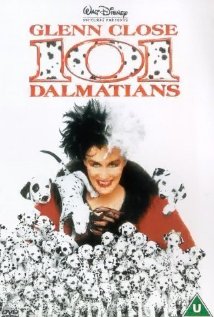
101 DALMATIANS
US, 1996, 106 minutes, Colour.
Glenn Close, Jeff Daniels, Joely Richardson, Joan Plowright, Hugh Laurie, Mark Williams, John Shrapnel, Tim Mc Inerney, Hugh Fraser.
Directed by Steven Herek.
A live-action version of the very popular Disney cartoon of the 60s (and often re-released) 101 Dalmatians. Children will enjoy the dogs - puppies seem even more cuddly in real life than as cartoons. And for the parents there is the entertaining performance, no holds barred, of Glenn Close as arch-villain, Cruella de Ville, the fashion designer who has a passion for fur. A film like this does more, perhaps, for saving animals than protests and demonstrations! Fun and fur.
1. The classic animated film? 30 years later, live action – presented in live action cartoon style?
2. The title, the focus on the dogs, the threats, and the coats to be made from their skins?
3. The London setting, the vet, the fashion world? The locations? Homes? The couple, their dogs, the Nanny?
4. Roger, his work as a vet, the encounter with Anita, marrying, walking the dog, Anita walking the dog, marriage, setting up a family? The work in fashion, her designs?
5. Cruella de Vil, being presented as the equivalent of a witch, her fashion company, as a boss, the lavish style, her designs?
6. A lot of spots, the plan to abduct the puppies, holding them, her intentions? Her interactions with Anita, with Roger, wanting to get her own way, unscrupulous – and cackling?
7. The abductors, the range of puppies, taking them, holding them? Caricature characters, the slapstick’s? Jasper and Horace?
8. The animals, the range of dogs, the range of animals, Communications, going to the rescue, the personalities of the animals, their adventures, the rescue, the pursuit, the arduous journey?
9. Nanny, her character, confronting the abductors?
10. Skinner, his role, negotiations, sinister?
11. Cruella, her plans, unscrupulous, defeated – and waiting for another day?
Published in Movie Reviews
Published in
Movie Reviews
Tagged under
Saturday, 18 September 2021 19:56
Gabriel over the White House
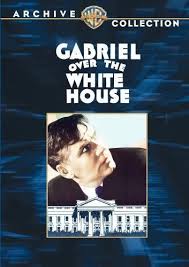
GABRIEL OVER THE WHITE HOUSE
As, 1933, 86 minutes, Black-and-white.
Walter Huston, Karen Morley, Franchot Tone, Dickie Moore, Samuel S.Hinds, Jean Parker.
Directed by Gregory La Cava.
Gabriel over the White House is quite a title.
This is a film released in 1933, the first year of the presidency of Franklin D. Roosevelt, but made before his election. It reflects the anxiety of the Depression with so many unemployed and the challenge for the American government.
In this scenario, a party hack, played by Walter Huston, is elected to toe the party line but not to make any decisions. He is rather carefree, goes for a drive and is involved in an accident and, in hospital, has a strange experience, indicated by white light, of the presence of the Angel Gabriel who transforms him into something of a crusader, much more business-like to his staff, going out to meet the leaders of the protests.
There is a complication with some racketeers who defy the president and assassinate the leader of the protests.
However, the president appoints his young assistant, played by Franchot Tone, to head up an organisation, very militaristic in its attitude and uniforms, to hunt out the racketeers and to try them, in a stylised-looking court, and then to execute them by firing squad. From the perspective of the 21st century, this is rather disturbing.
However, the film was produced by press baron, William Randolph Hearst (later to be the subject of Orson Welles’ Citizen Kane), a powerful man with his media, his yellow press, with presidential ambitions, and sympathy for fascist methods for imposing law and order.
Which means that, despite the disturbance, this is a very interesting film in the light of subsequent American history.
1. The title? Expectations? Americana? Politics? Religion?
2. Gabriel as a symbol from the Jewish Scriptures, the end of days, the messianic age, angel of light? Symbolic images of light?
3. MGM production values, the early 1930s? The cast? Black-and-white style? The musical score?
4. William Randolph Hearst as producer? His ideas, dictatorial, the touch of the fascist, ambitions politically in America? The making of the film? Dramatising his ideas?
5. The US in the 1920s, the depression, 1932-33, the election of 1932? The coming of Roosevelt, the New Deal?
6. Hammond, Walter Huston, the party man, the hack, his election, with his supporters, and his promises, not intending to keep them, settling into comfortable life in the White House? The relationship with Pendy, her coming to work? His friendship with Jimmy, the chat, play and serious? Beck, his political career, adviser, a young man at the White House?
7. The presentation of the people, the mass of the unemployed, the leader, the group, the protests and demonstrations?
8. Hammond, doing nothing, going driving, carefree, the accident, his recuperation, the light, the experience of Gabriel?
9. His becoming a new person, the way he treated people, the use of their names, the strong meetings, opinions, firing people? The confrontation with Congress? Going out to meet the people, the poor, at the protests, his plans?
10. His significance as President, his encounters with people, his speeches, hopes, the economy?
11. The presentation of Diamond, gangster, killer, prison, release, his henchman, involvement in rackets, opposing the President? The contract on the leader of the protest and his death?
12. The background of the story of Al Capone, arrest, charges, taxes? The presentation of the stylised court, the hearing, the condemnation? The visual fascist look of the trial? The presentation of fascist attitudes in the film? The firing squad, Beck, in uniform, in charge of the investigation, the ruthlessness, the military?
13. The parallel with the fascist dictatorships in Europe at the time? Hearst and his admiration?
14. The President, moving in and out of different personalities, the Gabriel vision taking over?
15. The international meeting, the issue of American debts, the representatives from the different nations, the speeches? The visuals of the bombing of the Navy ships? The stirring of the delegates, their signing, a foreshadowing of United Nations meetings?
16. The President, his death, achievement? The attitudes of Pendy, approval, disapproval? Beck? And the romance between the two?
17. The film as a fable, fantasy, with relevance to their political situations of 1933?
Published in Movie Reviews
Published in
Movie Reviews
Tagged under
Saturday, 18 September 2021 19:56
Irene/ 1940
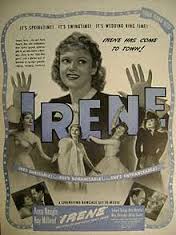
IRENE
US, 1940, 101 minutes, Black and white and Colour.
Anna Neagle, Ray Milland, Roland Young, Alan Marshall, May Robson, Billie Burke, Arthur Treacher, Marsha Hunt, Isabel Jewell, Stuart Robertson.
Directed by Herbert Wilcox.
Irene one of three films (including Sunny, No No Nannette) made by Anna Neagle and her husband, Herbert Wilcox, in the United States at the beginning of the 1940s. While the films were pleasant, the couple did not break into Hollywood and returned to the UK. Wilcox had directed Anna Neagle in over 20 films from the 1930s to the 1950s, many historical films where she played Queen Victoria, several times, Florence Nightingale, war heroine, Odette. They made a number of bright and very popular musical comedies with Michael Wilding in the 1940s.
In this film, from a Broadway musical by James Montgomery, she plays a young Irish woman who migrates to New York City, has a job in upholstery, is very forthright in her views. By chance, during a visit to a long island mansion, she comes to the attention of the son of the family, played by Australian Alan Marshall, but also to his guest, Don, played in his suave manner by Ray Milland. He offers her a job modelling dresses for the designer Mme Lucy. After being accosted by the manager, she walks out in high dudgeon, Don firing the manager and appointing an older genial man, played by Roland Young, who is to deliver Irene back.
Irene is very bold, selling a number of dresses, being asked to model the main designs by Mme Lucy, especially for a society ball – but her dress gets Irish stew all over it and she has to wear a dress from her actress mother, a blue gown – which leads into the most popular song from the play and film, Alice Blue Gown. And the film moves into colour for about 15 minutes in the middle of the film for the ball.
There are various mixups, her having two suitors, the old manager creating a false identity for her and make her part of society. Just when things seem to be awkward, the truth is out and she and Don are to be married.
The film is quite International with Anna Neagle, Ray Milland, Roland Young, British, with Alan Marshall and May Robson as Gran, Australian, and Arthur Treacher as the sometimes insufferable butler, also nose-up British.
1. Hollywood, 1940, the piece of Americana? From a Broadway musical to the screen?
2. An American production, RKO, but the British presence, stars and director, Australian presence with Alan Marshall on May Robson? International?
3. A Contemporary Fairytale, Simplicity, Wealth, a Capitalist Dream?
4. Black-and-white photography, Long Island, the apartment and migrants in New York, the mansions, the dress shops and display rooms, restaurants and diners? The Ball? Moving into colour, Costumes and Decor?
5. The Musical Score, the songs: Irene, Out on a Limb, Alice Blue Gown?
6. Anna Neagle, her career with Herbert Wilcox over so many decades and films? An Irish character, the visit for examining the upholstery, her direct way of speaking, meeting with Don, saying she was hungry, the food, discovering it belonged to Eleanor? Bob and his attraction? The butler and his superciliousness?
7. At home, the apartment, Gran, the family background, acting, coming from Ireland, her job with upholstery, her friends, the sister and brother at home? Her being offered a job by Don, Gran not approving?
8. Don, the reality that he was Madame Lucy? Friendship with Bob, the investment? Following Irene, the offer of the job, going to the interview, her being accosted, her leaving and her anger?
9. The manager, his being sacked by Don, his attack on Smith, Don inviting Smith to stay, to manage, use his ideas, win Irene back? Mr Smith and his visit and persuading her? Charming Gran?
10. Don and his influence on Irene’s career, Bob and his visiting? Irene modelling the dresses for his mother, being very forward, success? And the gown for the ball?
11. Smith, his idea for the ball, all the models wearing Madame Lucy dresses? Bob not liking it, hearing that Irene would be there? The night of the ball, her being late, assisted trying on the dress, the stew ruining it? The tears?
12. The transition to colour, Irene’s arrival, the Alice Blue Gown? Attracting everyone? High society, Don’s mother and her chatter, mistaking Irene for Irish aristocracy?
13. Don and his going to Bermuda, on the yacht, the message from Irene, his return?
14. The journalist and the model and his column and the reactions?
15. His confronting Smith, not liking what had happened to Irene, the false identity, her glamour, costumes, reputation, with society? Irene enjoying it? At the theatre, the Moviebone newsreel? Alice Blue Gown and the American dancing version? African –American performers, Don and the huff?
16. Confronting Irene, the truth about Madame Lucy?
17. Bob, proposal, the marriage, the preparations, the dresses? Bob and Eleanor, her disappointment? The wedding rehearsal, Irene not going? Don and his turning up, a beautiful dancing, not in love with Bob and thinking she was telling him? Bob and Eleanor at the church, the realisation about the truth?
18. And, the requisite happy ending?
Published in Movie Reviews
Published in
Movie Reviews
Tagged under
Saturday, 18 September 2021 19:56
I Married and Angel
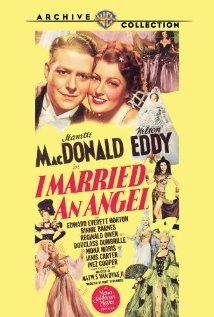
I MARRIED AN ANGEL
US, 1942, 84 minutes, Black and white.
Jeannette Mac Donald, Nelson Eddy, Edward Everett Horton, Binnie Barnes, Reginald Owen, Douglass Dumbrille, Mona Maris, Janis Carter, Leonid Kinski.
Directed by W.S. Van Dyke.
This was the last of eight MGM musicals with the pairing of Jeannette Mac Donald and Nelson Eddy. Its appeal will be to those who love the golden years of Hollywood as well as the fans of the singing couple. Others may find it something of an antique and an oddity.
The film was based on Broadway musical with music and lyrics by Richard Rodgers Lorenz Hart, principally the title song, I Married and Angel.
The setting is Budapest in the 1920s, the atmosphere of a middle European city, its high lifestyle, its aristocracy, the bankers – and ordinary people, like secretaries iin the bank. While the setting is some kind of realism, the bulk of the film consists of dreams which Nelson Eddy has, engaging in a different kind of romance.
He plays Willi, a womanising playboy, an heir to a banking family, expecting promotion but doing nothing to take responsibility. He is accountable to one of the executives, Whiskers, played by Reginald Owen who disapproves of auditors relationships. In the bank is one of the secretaries, played by Mona Maris, who is in love with him, and very supercilious to the other secretary played by Jeannette Mac Donald.
When a huge society ball is planned, Jeanette Mac Donald is invited, not as a compliment, but in a set up. It is a costume ball and she decides to go as an angel, getting nervous on entry, one of her wings getting unstuck, her meeting Willi but spending most of the time sitting as a wallflower eating some birthday cake.
Then the fantasy begins Jeannette Mac Donald appearing as an angel, in love with Willi, knowing all about him, commenting on him, discussing how different it is to be an angel in heaven and to be on earth. He becomes infatuated, falling in love with her, keeping the other guests from the party out of his office, deciding to marry her and go to Paris where he is pursued by his assistant, Peter, Edward Everett Horton.
This is all part of the dream – and the action recurs to Willi, asleep on the couch, then continuing his dream.
There are some risque ideas and lines, especially for 1942, about angels, becoming humans, their sexuality.
Ultimately, Willi wakes up, tells everybody, especially his confidante, played by Binnie Barnes, that he intends to marry – and then finds the secretary, noticing her resemblance, offering to marry her – with the approval of Reginald Owen.
There are several songs from Rodgers and Hart but the main emphasis is on the theme song I Married and Angel.
The film was directed by W.S. Van Dyke, who directed so many of the previous musicals.
Something of a historical piece.
Published in Movie Reviews
Published in
Movie Reviews
Tagged under
Saturday, 18 September 2021 19:56
Her Cardboard Lover
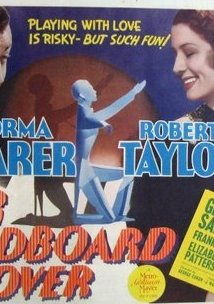
HER CARDBOARD LOVER
US, 1942 86 minutes, Black-and-white.
Norma Shearer, Robert Taylor, George Sanders, Frank Mc Hugh, Elizabeth Patterson, Chill Wills.
Directed by George Cukor.
This was Norma Shearer's last film. She had appeared in some silent films, moved into sound films winning one of the early Oscars for The Divorcee (1930). During the 1930s, she had a very successful career with Romeo and Juliet, David Copperfield and The Women. She was also married to the MGM whizzkid, Irving Thalberg.
This is a very slight comedy, based on a European play with various writers working on it including P.G.Wodehouse. It is very much a film of its times – or a descendant of the 1930s screwball comedies.
Robert Taylor, in something of a romantic comic role, not always his forte, portrays a songwriter (in partnership with Frank Mc Hugh) who becomes infatuated on first sight with a socialite, played by Shearer. He follows her around a casino, eventually getting the courage to speak to her but is rebuked. When he owes her money for having intervened absentmindedly at the gambling table, she employs him to pay off the debt to keep her from a foolish relationship with a cad and bounder, played with his usual suave style by George Sanders. Elizabeth Patterson plays her maid who is not a friend of Sanders.
A great deal of the film shows all the means that Taylor goes to to stop Shearer from communicating with Sanders, even pretending to be her cardboard lover – which leads to some histrionics on her part as she continually is infatuated with the fickle Sanders, and Taylor taking seriously all the means to control her – which includes getting dressed in her pyjamas to make suggestive insinuations for Sanders.
Eventually, there are some fights, presence in court presided over by Chill Wills, and a final realisation about whom she is in love with!
The film was directed by George Cukor, already a significant presence in Hollywood with Little Women, films with Katharine Hepburn and Cary Grant, The Philadelphia Story – and was to continue his career into the 60s with many significant films, winning an Oscar for My Fair Lady.
Film buffs who enjoye the golden years of Hollywood and those interested in the careers of the stars will find the film interesting and entertaining. For more modern taste, it seems completely unrealistic, sometimes over the top, contrived romance.
Published in Movie Reviews
Published in
Movie Reviews
Tagged under